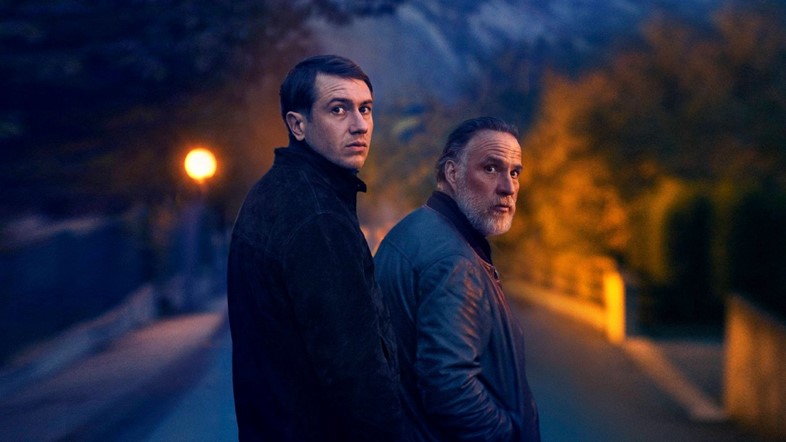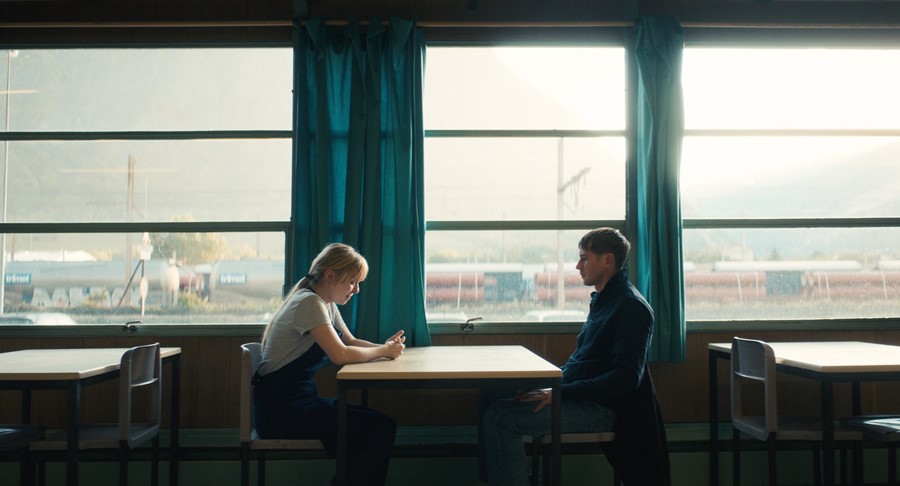Dominik Moll talks about why his new detective film resonates with the #MeToo movement, and how women’s sexuality is used against them in criminal cases
In France, they have their own Everything Everywhere All at Once. Sweeping this year’s César Awards – effectively the French Oscars – was Dominik Moll’s The Night of the 12th, a gritty detective drama that won six prizes, among them best film, best director, and best adapted screenplay. “It resonates a lot with themes that are very present in society and that have been triggered by the #MeToo movement,” says Moll on a video call from his home in Paris. “We got a lot of responses from women who said they’re very grateful for the film.”
Redolent of David Fincher’s Mindhunter and Bong Joon-ho’s Memories of Murder, Moll’s psychological thriller details the physical and mental toll upon a detective, Yohan (Bastien Bouillon), who’s faced with an unsolvable murder. One night, a teenager, Clara (Lula Cotton-Frapier), is burned alive with petrol by a mysterious stranger. Suspects include a horny teen boy, a musician who raps about murderous fantasies (unfortunate timing, he claims), and a wife-beater in his forties. Increasingly tormented by the possibilities, Yohan wonders: if most murderers are male, why is it usually men who are assigned to solve the case?
Moll and his regular co-writer, Gilles Marchand, adapted The Night of the 12th from a chapter out of Pauline Guéna’s 2020 non-fiction book 18.3: Une année à la PJ. Whereas Guéna documented a year spent with the PJ (the police judiciaire), Moll hones in on a single case, dramatising the information to fit the structure of a movie; it’s full of twists and turns, each scene reveals clues for the viewer to identify, and within 114 minutes of efficient storytelling it conveys the years of anguish for all involved.
As Guéna spent so long researching and writing the book, she declined to assist with the screenplay. Thus a dilemma: Moll and Marchand were two men adapting a project originally penned from a woman’s POV into a male-dominated world. “We could call Pauline whenever we had questions on a technical police detail,” says the 60-year-old French director. “But the [theme of] men/women relationships isn’t really in the book. It’s something we developed – not to be opportunistic after the #MeToo movement, but to translate the worries we had when writing the film. In a way, we made the same journey that Yohan goes through in the film. It’s more about asking questions than making a manifesto with statements.”
A key scene involves Yohan interrogating Clara’s best friend on the subject of Clara’s relationships with men, some her age, several a decade or two older. Using a hidden camera on a nearby tombstone, Yohan even captures an unidentified male figure undressing and serenading the dead teen’s grave at 3am. However, Clara’s grieving pal battles against the detective’s prejudices: in a murder investigation, why should it matter if Clara was promiscuous? Yohan’s sunken facial response is full of shame.

“What Clara’s friend is talking about – making women mostly responsible for the violence they suffer from because of their sexuality – it’s very present in our advanced western society,” says Moll. “It’s been ignored often in crime shows and films. Also, the fact that if men are investigating violence committed by other men, what does it say about our society? It’s strange because it leaves women in the role of the victim, and only the victim.”
Moll and Marchand, who often write as a duo, are masters of the thriller genre. Moll’s best-known features include Harry, He’s Here to Help and Lemming; Marchand, meanwhile, helmed the extremely underrated sci-fi Black Heaven which he penned with Moll. “The one who comes up with the initial idea will be the one who directs it,” Moll explains. “It’s not like we flip a coin.” So it’s a constant race to see who can mention a potential movie first? “Exactly!”
Always big on visual storytelling, Moll inserts a recurring, poetic image of Yohan cycling in circles in a velodrome, not unlike the unfortunate rodent of Lemming. Moll, though, borrowed the conveniently metaphorical hobby from Guéna’s book and his own research – albeit not the velodrome aspect. “When I was in Grenoble, a lot of police investigators had bikes in their office, and, in their spare time, went cycling in the mountains. Others did workouts and boxing. They have to keep in shape, but it allows them to release the tension and pressure.”

Workwise, though, the pressure remains a 24/7 obsession. In the opening minutes, a piece of onscreen text highlights how many homicide cases remain unsolved. With Poirot or a Knives Out movie, it’s a given that the killer will be revealed. Even in Zodiac, a movie that famously doesn’t identify the murderer, Jake Gyllenhaal still pinpoints the most likely suspect, staring him down in the final scene. Defying expectations, The Night of the 12th instead leaves the mystery open-ended. Then again, perhaps Moll is simply following through on the film’s early warning.
“When I read Pauline’s book, the whole interest in the story was because it was unsolved,” says Moll. “We wanted to describe what happens to police investigators when they can’t solve a case, what frustration and anger it generates, and how they live with it. It wasn’t a wish to frustrate the viewer – we still want the audience to be an active part of the film. But if the crime isn’t resolved, we could concentrate on Yohan’s evolution throughout the film.”
By ending on a downbeat note, The Night of the 12th illustrates the kind of depressing reality you’d expect when a film is based on a real story, not a piece of tidy fiction. Nevertheless, the awards success indicates that Moll and Marchand struck a chord with the general public. “We wouldn’t have made the same film five years ago, because we wouldn’t have asked ourselves the same questions,” says Moll. “Apparently, in France, the audience were waiting for a film like this.”
The Night of the 12th is out in UK cinemas now.
